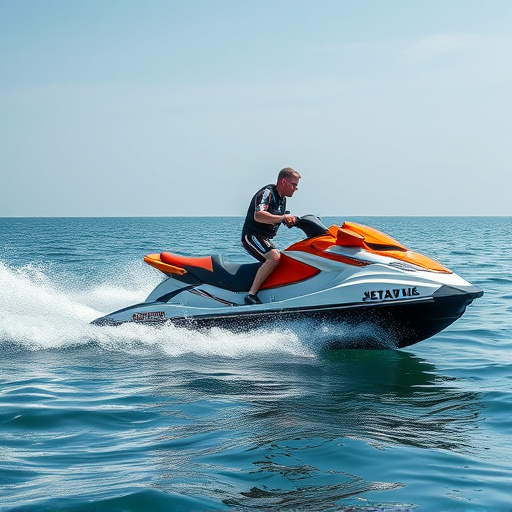Regularly inspect boat batteries for damage, corrosion, and leaks to prevent short circuits. Maintain optimal electrolyte levels to avoid overcharging/undercharging hazards. Keep batteries cool, dry, and protected from direct water contact. Avoid extreme charging/discharging conditions to prolong battery life. Store spare batteries securely in cool, dry locations away from flames. Implement fire safety measures at dockside to mitigate risks.
“Ensuring fire safety around marine batteries is paramount for any boater. This comprehensive guide offers critical insights into protecting your vessel from potential hazards. From understanding the chemistry behind boat batteries to implementing robust dockside safety measures, these top 10 tips cover essential aspects of boat battery care. Learn how to inspect for damage, maintain optimal electrolyte levels, prevent overcharging and deep discharging, and securely store spare batteries to minimize fire risks associated with these vital components.”
- Understand Boat Battery Chemistry
- Inspect for Damage Before Use
- Maintain Proper Electrolyte Levels
- Keep Batteries Cool and Dry
- Avoid Overcharging and Deep Discharging
- Store Spare Batteries Securely
- Implement Fire Safety In The Dockside
Understand Boat Battery Chemistry

Understanding the chemistry behind your boat battery is a crucial first step in ensuring fire safety. Boat batteries, typically lead-acid batteries, contain a mix of sulfuric acid and water. This corrosive solution is what generates the electrical power for your vessel’s operations. While highly efficient, this chemical reaction also produces heat and gases that can be flammable under certain conditions. The lead plates within the battery can react with the acid, forming lead sulfate, which can cause short circuits and spark ignitions if not maintained properly. By grasping these basic principles, boaters can better appreciate potential hazards and implement effective safety measures to prevent fires.
Regularly inspect your boat battery for any signs of damage, corrosion, or leakage. Maintain proper electrolyte levels, ensuring the battery is fully charged but not overcharged. Keep the battery area clean and dry, as moisture can accelerate chemical reactions and contribute to short circuits. Store spare batteries securely, away from direct sunlight and heat sources, to prevent accidental activation or thermal runaway. These simple practices help ensure your boat’s electrical system operates safely and reduces the risk of a fire sparked by chemical reactions within the battery.
Inspect for Damage Before Use

Before using any marine battery, it’s crucial to conduct a thorough inspection for any signs of damage. Over time, boat batteries can sustain nicks, cracks, or leaks, which not only affect their performance but also pose significant safety hazards. Always check for any visible wear and tear, especially around the terminals and casing. Ensure all connections are secure and tight, as loose connections can lead to short circuits and potential fires.
Regular inspection is a critical fire safety tip that often goes overlooked. By identifying damaged batteries early, you can take preventive measures such as replacing them before they become a risk. Remember, a well-maintained boat battery is less likely to cause a fire, ensuring a safer sailing experience.
Maintain Proper Electrolyte Levels

Maintaining proper electrolyte levels in your marine boat battery is a crucial fire safety tip. Battery fires often ignite due to overcharging or undercharging, leading to a buildup of corrosive materials that can cause short circuits. Regularly check and top up the electrolyte levels with distilled water to ensure optimal performance and prevent accidental sparks that could start a fire.
Remember, keeping your boat battery well-maintained not only reduces the risk of fires but also ensures your vessel’s overall reliability. Always use the right type of water and follow manufacturer guidelines for maintenance to keep your marine battery in top condition, enhancing safety during your sailing adventures.
Keep Batteries Cool and Dry

Maintaining your boat battery in optimal condition is paramount for ensuring both performance and safety. One crucial aspect is keeping your boat battery cool and dry. Extreme temperatures can significantly impact its lifespan and efficiency, so storing it in a shaded, well-ventilated area is essential. Additionally, always ensure the battery is protected from direct contact with water or moisture to prevent short circuits and potential fires.
Regularly inspecting and maintaining your boat battery can help identify any signs of damage, corrosion, or leaks. These issues not only compromise the battery’s performance but also pose a safety hazard. By keeping your boat battery cool and dry, properly storing it when not in use, and performing routine maintenance, you can significantly reduce the risk of fires and extend the lifespan of your valuable equipment.
Avoid Overcharging and Deep Discharging

Overcharging and deep discharging a marine boat battery can lead to safety hazards and reduced lifespan. Always avoid overcharging by maintaining a balanced charging cycle. Excessive charging can cause overheating, leading to potential fires and explosion risks. Similarly, deep discharging should be avoided as it can damage the battery’s internal structure, making it more susceptible to short circuits and thermal runaway, both of which can ignite flames.
To prevent these issues, regularly monitor your boat battery’s state-of-charge using a voltmeter. Keep the charging voltage within the recommended range, typically between 12.6 and 12.8 volts for a 12V marine battery. When not in use, consider storing the battery at a partial charge level of around 50% to avoid prolonged deep discharge cycles.
Store Spare Batteries Securely

Storing spare boat batteries securely is a crucial marine safety practice that cannot be overlooked. Keep your backup batteries away from direct sunlight, heat sources, and any materials that could catch fire or spark. Choose a cool, dry location within your vessel, preferably in a designated battery compartment or locker. Ensure the area is well-ventilated to prevent the buildup of flammable gases.
Use secure mounting brackets or lockable containers to hold your spare batteries in place, preventing accidental movement or damage. This simple step goes a long way in reducing the risk of a fire sparked by a loose or damaged battery, ensuring the safety of your boat and its occupants at all times.
Implement Fire Safety In The Dockside

Implementing robust fire safety measures at your dockside is an essential step in ensuring the well-being of both your crew and your valuable boat batteries. Since boat batteries are a common source of ignition, it’s crucial to maintain a clear fire safety plan. Start by keeping a safe distance between batteries and any potential flammable materials. Regularly inspect and clean the area around your boat battery to prevent short circuits and spark formation. Ensure proper ventilation to reduce the risk of gas accumulation, which can be highly explosive.
Designate specific areas for smoking, away from the dock and battery compartments, and educate all crew members about fire safety protocols. Install reliable fire detection systems capable of identifying even the smallest spark or smoke. Regularly test these systems and maintain them in optimal condition. Having a well-equipped fire extinguisher readily available is also vital. Remember, quick response and proper training can significantly mitigate potential hazards associated with boat batteries on dockside.
When it comes to marine battery safety, preventing fires is paramount. By understanding the chemistry behind your boat batteries, performing regular inspections, and adhering to best practices like maintaining electrolyte levels, keeping them cool and dry, avoiding overcharging and deep discharging, and secure storage, you significantly reduce the risk of a hazardous fire. Always prioritize fire safety at the dockside and stay vigilant for potential issues. These top 10 tips are your first line of defense in ensuring a safe boating experience.
